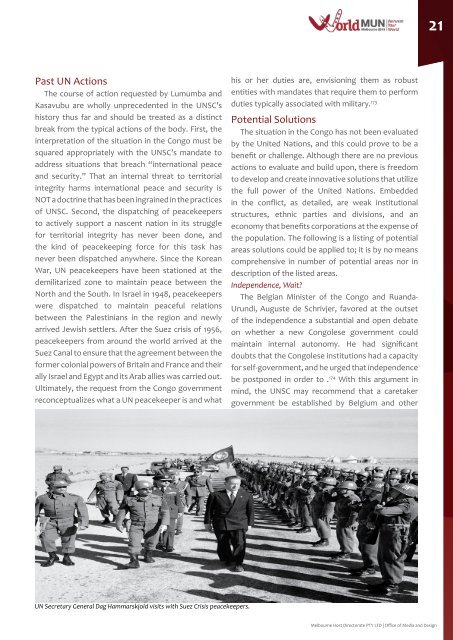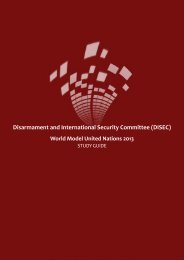Historical Security Council - World Model United Nations
Historical Security Council - World Model United Nations
Historical Security Council - World Model United Nations
Create successful ePaper yourself
Turn your PDF publications into a flip-book with our unique Google optimized e-Paper software.
Past uN Actions<br />
The course of action requested by Lumumba and<br />
Kasavubu are wholly unprecedented in the UNSC’s<br />
history thus far and should be treated as a distinct<br />
break from the typical actions of the body. First, the<br />
interpretation of the situation in the Congo must be<br />
squared appropriately with the UNSC’s mandate to<br />
address situations that breach “international peace<br />
and security.” That an internal threat to territorial<br />
integrity harms international peace and security is<br />
NOT a doctrine that has been ingrained in the practices<br />
of UNSC. Second, the dispatching of peacekeepers<br />
to actively support a nascent nation in its struggle<br />
for territorial integrity has never been done, and<br />
the kind of peacekeeping force for this task has<br />
never been dispatched anywhere. Since the Korean<br />
War, UN peacekeepers have been stationed at the<br />
demilitarized zone to maintain peace between the<br />
North and the South. In Israel in 1948, peacekeepers<br />
were dispatched to maintain peaceful relations<br />
between the Palestinians in the region and newly<br />
arrived Jewish settlers. After the Suez crisis of 1956,<br />
peacekeepers from around the world arrived at the<br />
Suez Canal to ensure that the agreement between the<br />
former colonial powers of Britain and France and their<br />
ally Israel and Egypt and its Arab allies was carried out.<br />
Ultimately, the request from the Congo government<br />
reconceptualizes what a UN peacekeeper is and what<br />
UN Secretary General Dag Hammarskjold visits with Suez Crisis peacekeepers.<br />
his or her duties are, envisioning them as robust<br />
entities with mandates that require them to perform<br />
duties typically associated with military. 173<br />
Potential Solutions<br />
The situation in the Congo has not been evaluated<br />
by the <strong>United</strong> <strong>Nations</strong>, and this could prove to be a<br />
benefit or challenge. Although there are no previous<br />
actions to evaluate and build upon, there is freedom<br />
to develop and create innovative solutions that utilize<br />
the full power of the <strong>United</strong> <strong>Nations</strong>. Embedded<br />
in the conflict, as detailed, are weak institutional<br />
structures, ethnic parties and divisions, and an<br />
economy that benefits corporations at the expense of<br />
the population. the following is a listing of potential<br />
areas solutions could be applied to; it is by no means<br />
comprehensive in number of potential areas nor in<br />
description of the listed areas.<br />
Independence, Wait?<br />
the Belgian Minister of the Congo and Ruanda-<br />
Urundi, Auguste de Schrivjer, favored at the outset<br />
of the independence a substantial and open debate<br />
on whether a new Congolese government could<br />
maintain internal autonomy. He had significant<br />
doubts that the Congolese institutions had a capacity<br />
for self-government, and he urged that independence<br />
be postponed in order to . 174 With this argument in<br />
mind, the UNSC may recommend that a caretaker<br />
government be established by Belgium and other<br />
21<br />
Melbourne Host Directorate PTY LTD | Office of Media and Design
















